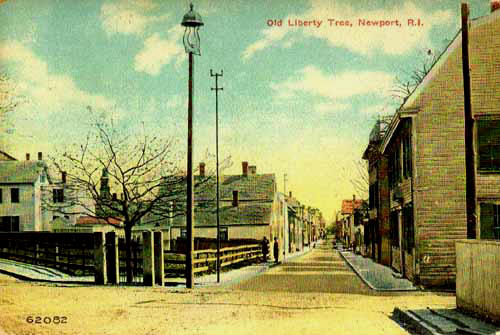 William Ellery
William Ellery
 William Ellery
William Ellery
Ellery was born during the Christmas Season.
Home and property destroyed at Newport, RI;
Ellery kept busy, rebuilt; his spirits still high.
William Ellery's ancestors were originally from England and emigrated to America during the latter part of the seventeenth century. Throughout his childhood, his father Benjamin guided him well in education, even in following his footsteps to attend Harvard. Known for his ready wit and deep intelligence, he graduated at the age of twenty years with admirable commendations from the faculty.
William Ellery worked first as a merchant, then a collector of customs, and later as the Clerk of the Rhode Island General Assembly. He seemed to find the career he had been searching for when he began to practice law at the age of 43 in Newport, which was then one of the most flourishing places in the colonies. He worked successfully for many years and acquired a fortune.
When the troubles of the Revolution began, he became involved in public service and was active in the Rhode Island Sons of Liberty. Upon the death of Samuel Ward,* he was sent to the Continental Congress in 1776.
You must exert yourself. To be ruled by Tories, when we may be ruled by Sons of Liberty – how debasing. You must rouse up all that is Roman in Providence. There is liberty and fire enough; it only requires the application of the bellows. Blow, then, a blast that will shake this country.
During the occupancy of the British in Newport, he suffered the loss of property and financial bankruptcy. His home was burned down and his family harassed. Though saddened, he was not
disheartened. He was a man of faith and quietly believed that his sacrifice would serve an historical good in the long run.
He was appointed to the Board of Admiralty and the Marine Committee where he became very involved and innovative. In 1779 he was chairman of a committee to help Rhode Island rebuild after destruction by the British occupation. In 1785, he was one of a committee to whom the Treaty of Peace with Great Britain was referred. At this time, he was a judge of the Supreme Court of Rhode Island and made strong efforts to have slavery in the United States abolished, supporting the resolution made by Rufus King. B. J. Lossing, Signers of the Declaration of Independence, George F. Cooledge & Brother: New York (1848) [reprinted in Lives of the Signers of the Declaration of Independence, WallBuilder Press: Aledo, Texas (1995)], page 47-49.
Abigail died in 1793 before her husband, he dying in 1820 at 93 years of age in his old flag bottomed chair. He had been reading Cicero's De Ofliciis.
"He looked upon the world and its convulsions with religious serenity, and in times of public danger, and of public difficulty, he comforted himself and others, with the pious reflection of the psalmist, 'The Lord reigneth.'" Rev. Goodrich Lives of the Signers to the Declaration of Independence. New York: William Reed & Co., 1856. Pages 183-186.
"As a patriot and a Christian, his name will ever be revered." B. J. Lossing, Signers of the Declaration of Independence, George F. Cooledge & Brother: New York (1848) [reprinted in Lives of the Signers of the Declaration of Independence, WallBuilder Press: Aledo, Texas (1995)], page 49.
*Samuel Ward was elected Rhode Island's governor in 1762, serving additional terms in 1765-66. He was also the only colonial governor who refused the oath to enforce the Stamp Act. He helped found the College of Rhode Island which he served as a trustee from 1764 until his death. In 1774, Rhode Island sent Ward to the Continental Congress where he contracted smallpox and died in Philadelphia three months before he would have signed the Declaration of Independence.
His great-granddaughter was Julia Ward Howe who composed the "Battle Hymn of the Republic."
Ellery Avenue in Middletown, Rhode Island, is named in his honor.
Below post card is titled: 'Old Liberty Tree, Newport, R.I.' from around 1905-10. Ellery's home was nearby before it was demolished in 1920 and is represented with commemorative plaque on #9 Thames Street. Across the street - William Ellery Park, site of the Tree of Liberty, now a replacement for the much older tree that died. From Newport Post Card Museum and presented as a Public Service to the Newport Community.

http://www.thedeclarationofindependence.org/WilliamEllery.com/
William Ellery Channing Memorial Church History
Robert G. Ferris (editor), Signers of the Declaration: Historic Places Commemorating the Signing of the Declaration of Independence, published by the United States Department of the Interior, National Park Service: Washington, D.C. (revised edition 1975), pages 51-52.
Image above by Ole Erekson, Engraver, c1876, Library of Congress
Ellery, 1727-1820
Who shall separate us from the love of Christ? shall tribulation, or distress, or persecution, or famine, or nakedness, or peril, or sword?
Romans 8:35